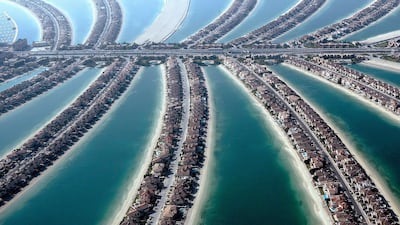The average price of prime residential property in Dubai – defined as the sector’s most expensive 5 per cent sub-segment – dropped 3.3 per cent between November 2016 and November 2017 amid subdued demand, according to Knight Frank’s 2017 Wealth Report.
But the number of real estate transactions rose during the period, with prices set to lift as the Emirate’s economy strengthens and the number of Dubai-based ultra-wealthy individuals rises, the real estate consultancy predicted.
“Dubai’s residential market has moved through a number of phases over the past five years. Strong price growth was replaced by price falls, but the latest data points to a recovery in demand and the beginning of a new pricing cycle,” said Taimur Khan, Dubai-based senior analyst at Knight Frank.
The price drop for Dubai’s prime residential segment was shallower than for other Arabian Gulf markets over the period, the consultancy's annual Wealth Report showed. Riyadh’s prime prices fell 5 per cent, Abu Dhabi’s by 10 per cent, and Doha’s 15 per cent.
Prime residential property values in Dubai have risen by 5.1 per cent over the five-year period to the end of 2017, with the emirate expected to lure more ultra-wealthy buyers in the years ahead with its strategic location and improving infrastructure.
The Emirate will witness a 60 per cent surge in the number of ultra-high-net-worth individuals (those with personal assets of $30 million or more) by 2026, according to the report.
“Factors such as relative affordability, ownership costs and the influence of currency fluctuations make Dubai attractive to wealthy residents from across the UAE, the wider Asian region and further afield,” said Lord Andrew Hay, global head of residential at Knight Frank.
Residential sales prices have in general declined over the past two years in Dubai amid weak economic conditions. Average apartment sales prices declined by 2 to 6 per cent year on year in the six months between April and October 2017, according to a Propertyfinder.ae report published in December.
Villa sales prices saw steeper declines over the period, of up to 9.3 per cent and 8.2 per cent in midmarket areas including The Meadows and Dubailand.
But prime sales prices were more resilient, Propertyfinder added, with villa prices in Emirates Hills and Jumeirah Park remaining stable over the period.
"The prime and super-prime markets are to some extent cushioned from [external market volatility] due to lower levels of supply," Liam Bailey, head of residential research at Knight Frank, told The National.
_______________
Read more:
Dubai to see 60% rise in ultra-wealthy individuals by 2026
Dubai a magnet for the world’s wealthy, says Knight Frank
_______________
Knight Frank’s report said established prime areas such as Emirates Hills, The Lakes, Palm Jumeirah and Downtown Dubai have continued to attract occupier and investor interest.
“Demand in those areas is expected to strengthen, the report said, underpinned by infrastructure investments including at Nakheel Mall on Palm Jumeirah, Dubai Mall, and other projects to enhance connectivity in Downtown Dubai,” the report said.
“The proximity of these locations to the new developments for Expo 2020 Dubai should help to underpin a gradual price recovery in prime residential markets. We expect this will be spurred by the weaker Emirati dirham, which depreciated by 6.8 per cent in 2017.
The volume of transactions of prime residential property in Dubai were up 6.6 per cent year on year in the second quarter of 2017 and 5.7 per cent in the third quarter – the first consecutive annual increase since the second quarter of 2013, and an encouraging sign, Knight Frank said.
What’s more, despite a steady long-term increase in prime values, Dubai remains comparatively affordable. With $1 million, investors can purchase 138 square metres of prime residential property in Dubai, versus 16 square metres in Monaco, 22 in Hong Kong, 25 in New York and 28 in London, the report said.
Prime properties in Dubai are approximately 40 per cent less expensive than Singapore and 50 per cent less than Moscow and Paris, said a separate study from consultancy Core Savills on Tuesday. “Prime and ultra-prime property prices in Dubai are now among the lowest of any comparable global hub,” the study said.

